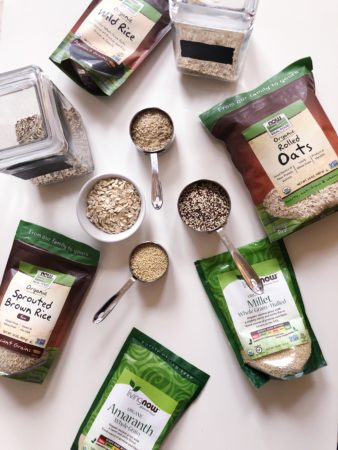 This post is sponsored by NOW Foods. All opinions are my own. Ten years ago when I became a Health Coach, grains were in and almost every product on the health food store shelves boasted a healthy-promoting “made with whole grains” label. Then the tides changed and everyone shunned grains and cut carbs. Now, you can find your favorite foods made sans grains – from grain-free breads to tortilla chips. The natural foods manufacturers have conditioned cosumers to think that a low carb diet is the best one. But that’s not true. Unless you have a medical reason to eliminate grains, your body needs them for energy, hormone balance and metabolism regulation. This is especially true of you’re a healthy, active woman. Here’s what you need to know about vitamin-packed whole grains: One // They’re nutritious. Whole grains are jam-packed with essential enzymes, iron, fiber and vitamins E and B-complex. Historically, the nutrition in whole grains gave people lean, strong bodies and they were seldom out of shape. Two // They’re energizing. Your body absorbs whole grains slowly and evenly making them an ideal source of high-quality energy. That slow, even absorption means you’ll stay satiated until your next meal without a blood sugar crash in between. Three // They’re a dietary staple around the world. Whole grains have long been central to the human diet. From rice to sorghum, traditionally, staple grains vary by country depending on climate and lifestyle. Choosing the whole grain means that you consume it in its most natural state with all of its naturally present nutrients intact. In the US, there are a plethora of grains from which to choose and they’re widely available. You can find them bagged or in bulk at your local supermarket or health food store. I get all my whole grains directly from NOW Foods. Use my discount code MARISSANOW10 for $10 off any order of $40 or more at NowFoods.com They carry many different kinds with varied nutritional profiles, flavors and textures. Amaranth boasts 9 grams of protein per cup and is an excellent source of calcium, magnesium and iron earning its status as a super-grain. Millet is a small, round grain popular all over the world. It’s high in protein, fiber, magnesium and potassium. Quinoa is a fast-cooking grain and it contains all eight amino acids which makes it a complete protein. It’s also high in B vitamins, iron, zinc and vitamin E. Oats contain soluble fiber making them a good choice for digestive health and regulating blood sugar. Brown Rice is a nutritional powerhouse packed with fiber, lignans (antioxidants) and magnesium. Wild Rice delivers a healthy dose of protein and fiber. Unlike other varieties of rice, wild rice is actually an aquatic grass seed that grows in lakes and streams. Other whole grains include barley, bulgur, polenta, kamut, buckwheat (kasha), spelt and wheat berries. Experiment and try differnt grains. You can get creative by adding spices, nuts, seeds and using different cooking methods.
This post is sponsored by NOW Foods. All opinions are my own. Ten years ago when I became a Health Coach, grains were in and almost every product on the health food store shelves boasted a healthy-promoting “made with whole grains” label. Then the tides changed and everyone shunned grains and cut carbs. Now, you can find your favorite foods made sans grains – from grain-free breads to tortilla chips. The natural foods manufacturers have conditioned cosumers to think that a low carb diet is the best one. But that’s not true. Unless you have a medical reason to eliminate grains, your body needs them for energy, hormone balance and metabolism regulation. This is especially true of you’re a healthy, active woman. Here’s what you need to know about vitamin-packed whole grains: One // They’re nutritious. Whole grains are jam-packed with essential enzymes, iron, fiber and vitamins E and B-complex. Historically, the nutrition in whole grains gave people lean, strong bodies and they were seldom out of shape. Two // They’re energizing. Your body absorbs whole grains slowly and evenly making them an ideal source of high-quality energy. That slow, even absorption means you’ll stay satiated until your next meal without a blood sugar crash in between. Three // They’re a dietary staple around the world. Whole grains have long been central to the human diet. From rice to sorghum, traditionally, staple grains vary by country depending on climate and lifestyle. Choosing the whole grain means that you consume it in its most natural state with all of its naturally present nutrients intact. In the US, there are a plethora of grains from which to choose and they’re widely available. You can find them bagged or in bulk at your local supermarket or health food store. I get all my whole grains directly from NOW Foods. Use my discount code MARISSANOW10 for $10 off any order of $40 or more at NowFoods.com They carry many different kinds with varied nutritional profiles, flavors and textures. Amaranth boasts 9 grams of protein per cup and is an excellent source of calcium, magnesium and iron earning its status as a super-grain. Millet is a small, round grain popular all over the world. It’s high in protein, fiber, magnesium and potassium. Quinoa is a fast-cooking grain and it contains all eight amino acids which makes it a complete protein. It’s also high in B vitamins, iron, zinc and vitamin E. Oats contain soluble fiber making them a good choice for digestive health and regulating blood sugar. Brown Rice is a nutritional powerhouse packed with fiber, lignans (antioxidants) and magnesium. Wild Rice delivers a healthy dose of protein and fiber. Unlike other varieties of rice, wild rice is actually an aquatic grass seed that grows in lakes and streams. Other whole grains include barley, bulgur, polenta, kamut, buckwheat (kasha), spelt and wheat berries. Experiment and try differnt grains. You can get creative by adding spices, nuts, seeds and using different cooking methods.
- Use these tips for cooking and storing grains: Grains keep best stored in air-tight glass containers in a dark cupboard. Store them for up to 9 months.
- Rinse and soak grains prior to cooking to make them easier to digest and the nutrients more bioavailable.
- Dry roast grains (in a pan over a low flame) before cooking to unlock a richer flavor and make them more alkaline.
- Make a grain bowl with leftover whole grains as the base. Add your favorite cooked vegetables, proteins, avocado, nuts or seeds and a dash of tahini, hot sauce or coconut aminos for a tasty meal.
Use my discount code MARISSANOW10 for $10 off any order of $40 or more at NowFoods.com]]>



Leave a Reply